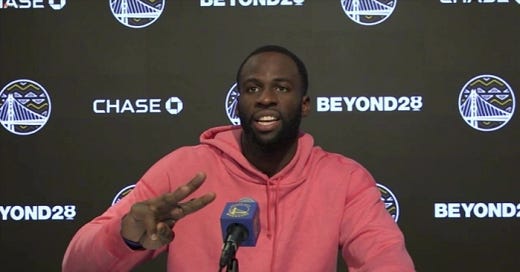When Jon Rothstein of CBS Sports tweeted about Jalen Johnson’s decision to opt out of the rest of Duke’s season, he got some pushback for calling it “quitting.” People were understandably reluctant to criticize an athlete for stepping back from such a tumultuous season. Johnson, like the rest of the Duke basketball team, has spent the season in odd, quasi-bubble conditions thanks to Covid-19, and seen games get abruptly cancelled and postponed. The weird circumstances have Johnson particularly hard, as he tries to come back from a foot injury with an unpredictable schedule.
Plus, as many were quick to point out, Johnson is not getting paid by Duke. It seems particularly unreasonable to ask him to put up with all this for no money—given the financial stakes for Johnson, who is projected to be a late lottery pick, it is arguably foolish to continue playing sparse minutes for a bad Duke team in front of an empty stadium.
In some ways, though, this answer is a cop out. The fact that college athletes are unpaid makes them sympathetic figures, but in this case it sort of misses the point. Would things be so different if Johnson were making a salary?
We got glimpses at an answer this week when Draymond Green talked in a press conference about Andre Drummond. It’s worth watching the whole video, but this was the crux of it:
“I would like to talk about something that’s really bothering me. It’s the treatment of players in this league. To watch Andre Drummond … come out in street clothes because a team is going to trade him, it’s bullshit. Because when James Harden asked for a trade and essentially dogged it… he was castrated for wanting to go to a different team, and everybody destroyed that man.”
(To be clear, Harden was indeed castigated for his behavior, but he was not, to my knowledge, castrated.)
Green is making a great point here. The two situations are effectively identical—a team’s best player is missing games, hurting the team’s chances of winning, in order to facilitate a trade. But the Drummond situation is a common practice in the NBA—the Detroit Pistons are doing the exact same thing with Blake Griffin right now—whereas Harden was seen as “quitting” on his team and criticized so harshly that some even compared him to Elon Musk.
Harden is a much harder figure to defend than Johnson: he’s not 19, he’s very well-paid, his reasons had nothing to do with health or the pandemic, he was flouting coronavirus protocols over the holidays, etc. But his behavior gets at the issue of quitting more directly, since he lacks the obvious excuses available to Johnson.
Of course, whenever there is a conflict between a player and management, I will side with the player. But if our defenses of player empowerment lead us to the position that “great players sitting out of basketball games for no real reason is good, somehow,” then I suspect we’ve kind of lost the thread somewhere. What was so great about Green’s statement was that he addressed the matter directly. He recognized that players missing games is a bummer while ALSO pointing out the hypocrisy: Hey, if you’re such a big believer in the spirit of competition, and showing up for your teammates, and playing hard no matter the score and situation… then why can’t Andre Drummond play tonight? But we only identify it as a problem when it comes from the player.
Personally, I’m a big fan of quitting. In general, I think anyone who can afford to quit their job should probably do so. So far be it for me to begrudge someone for quitting.
But there is a deeper problem in sports, an endemic non-competitiveness, and it’s a plague on every sport. It is far too common for teams to actively choose losing over winning. So Andre Drummond sits, Nolan Arenado and Mookie Betts get traded, and the Jets spend a decade tanking. People who only condemn this issue when it looks like a player “quitting” just like to hate workers, but that doesn’t mean the status quo is good.



